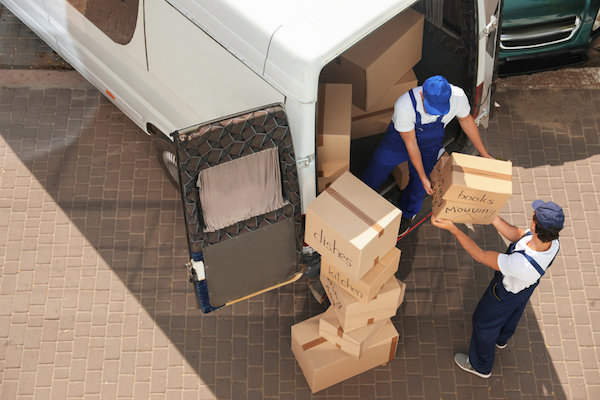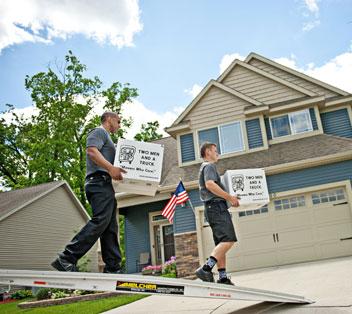Moving Guide: How To Start Planning for a Move
It’s official: you’ve decided to move. Maybe you got a new job, maybe you sold your current residence or maybe it’s just time for a change. Whatever your circumstances, the moment after you decide to move can be intimidating. It’ll probably dawn on you all at once just how big an undertaking moving can be. How do you even get started planning?
Well… you take it one step at a time! If you’ve just decided to move and have no idea how to start planning, this list is for you. By following these four steps, you’ll go from totally overwhelmed to totally prepared in no time flat. When you’ve got to start planning your move
RESEARCHING YOUR MOVING OPTIONS
First things first: are you going to try to do it all yourself or will you use a moving company? If so, which of the company’s services will you use? Will you require help packing? Transporting heavy, sensitive, or specialty items? Will you need to buy moving supplies and boxes, and can you get them from your mover? Should you invest in a mover protection plan? Will you need storage? Do you have any particular questions or concerns you’ll need an expert to answer?
Don’t panic if you don’t know the answers to these questions yet! Take your time researching and ask all of your questions as you think of them. Ask your moving company for a moving estimate. Our instant, free ballpark estimate factors in the size and distance of the move, as well as any additional services you’re considering. Asking questions and researching is a great first step toward preparing yourself for a move.
MAKING A MASTER MOVING LIST
Whether or not you’re using a moving company, creating a master list will be your next step. We recommend you organize your list room-by-room. Make lists of things you’ll need to move in your kitchen, bedroom, bathrooms, etc., including how and where you’ll pack these items, especially if you’ll rely on a moving service to do some of your packing. Consider creating another list of items to sell or donate. Have there been boxes in the basement you haven’t touched since you’ve put them there? Have your children outgrown clothing and toys? No need to move a lot of items you won’t use in the new home! These lists will come in handy whether you’re moving yourself or hiring a company.

How Much to Tip Movers: The Complete Guide to Tipping Your Moving Company
How much to tip movers might be the last problem to deal with after a day of stress-inducing and crazy-making situations; especially if you just finished a cross country move. You do not want to do is go into your moving day with no idea what the protocol is for tipping movers.
The end of the day could go something like this: The movers only have a few things left in the truck and the moment comes that you have been dreading. Panic sets in, sweat forms on your brow, and your heart starts to race. Yup, it’s time for the tip! No one wants to look cheap or unappreciative, but you don’t want to over tip either. Not that the movers would mind, but you are probably on a budget. Do you give it to one person and let them divide it or hand each person a tip individually? This guide should help you through that stressful moment when it comes.
Do You Have to Tip Movers?!
You might be saying, “Tip? What tip? Don’t they get paid an hourly wage?” Well, yes they do, but so does the casino dealer who deals you a straight flush and the valet person who drives your car a whopping 100 feet to you. Movers are included in the service industry and tipping is the way to show your gratitude.
provide such a valuable service. They are doing something you absolutely don’t want to do. You may not even be capable of doing it. Moving is back-breaking work. Every day, they risk injury. They go home sore, and do it all again the next day. They move in the bitter cold while you watch from inside a toasty window, and they move in the hottest conditions when no one in their right mind should be away from an air conditioner. If anyone deserves a tip, it’s your movers.
How Much to Tip the Movers?
Now we get to the nitty gritty details. Calculating how much to tip movers is, like any other service situation, based on the total amount you are spending and the quality of the move.
Guide to Moving Costs
Moving can be all at once an exciting and stressful time. Packing up all of your belongings, moving them to your new home, and getting settled in a new location can be a lot of work. While hiring a moving service makes the physical act of moving easier, it can come with a different set of stresses. Follow this guide to learn what you can expect to pay for moving and how to hire the right company for the job to ensure your move goes as smooth as possible.
How Much Does it Cost to Move?
The overall size of your home is the largest factor to consider when calculating the cost of your move. The below chart shows the average prices for a move based on average hourly rates charged by local moving companies. This includes the truck rental cost and the hourly rate charged by professional movers. There may be additional services and fees for things like long-distance moving, packing your items for you, storing items, and moving oversized items.
Cost of Moving Other Items (i.e. Cars and Pianos)
If you’re planning on moving large and heavy items, such as a piano, it’s important you realize this can cost you an additional $200 to $1048. If the movers need to use a crane to lift the piano this can cost up to an additional $3,200.
Certain items that are heavy and bulky that take up extra space in the moving truck will also cost more. These items include:
Pool tables
Swing sets
Motorcycles
Lawn tractor
Extra large furniture
If you need to move a car, you will need to hire a separate car transport service. Professional car-shipping companies usually charge based on the distance they need to travel to deliver the vehicle. For short distances, the cost is typically less than $1,300 per vehicle. As for long distance transports, the typical cost is $1,300 to $2,600 per vehicle.
MOVING GUIDE
6-8 Weeks Before Moving:
Make a list of items you plan on moving and items you wish to take to storage. Make a list of items to be handled by a mover (if you plan on using one) and those you will handle yourself. Get rid of items you don’t need – have a garage sale, give items to friends, donate items to local charities.
If you plan on using a moving company, get estimates from several moving companies.
Research and select a professional moving company. After selecting your mover, discuss costs, packing, timing and other necessary details.
Many moving expenses are tax deductible, so maintain a file with important information and receipts for moving related expenses.
If moving to a new community, it’s great to find out about schools, parks, recreation, and community programs prior to your arrival. Contact the local Chamber of Commerce and/or Visitor’s Bureau.
Prepare to transfer medical, property, fire and auto insurance through your insurance agent.
Place all your medical records in a safe place. Do not forget prescriptions, vaccination records and other important information.
4-5 Weeks Before Moving:
If you are planning to do some part of the packing, start collecting moving and packing supplies. These can be purchased from your self storage or moving company.
Contact the post office and fill out a US postal change of address form and provide your new address to your telephone company, trash company, cable / satellite, water, electric company, internet provider, insurance companies, banks and financial institutions, clubs, local government agencies and any other utility companies.
Register your children in their new schools. It would be a good idea to involve kids in the moving process. They can help pack their toys and items from their room.
Contact utility companies – electricity, gas, phone and others for disconnection after your scheduled move out. And call ahead to have utilities connected to your new home.
If you have pets make arrangements for transportation. Find out if there are specific requirements for pet ownership in your new township. Also obtain the veterinarian records.
2-4 Weeks Before Moving
If you have young children, you might want to arrange for a baby-sitter on moving day to ensure they remain safe during the loading process.
Remember to return library books and anything you have borrowed. Collect items you have loaned out.
You may NOT want to pack your valuables in the moving van, think about taking them with you.
Plants – Do you have a safe way to transport your plants? Plants could be given to friends or even a local charity.
If you are traveling by car, you may want to get your car serviced prior to departure.
Start packing items you don’t currently need. If renting a storage unit, determine which items go to storage and which items go to your new home.
Don’t forget anything in basements, attics, and closets. Don’t forget about clearing out safety deposit boxes.
Disassemble your computer and backup important computer files. Avoid exposure to extreme temperatures.
Dispose of flammable items like fireworks, cleaning fluids, matches, acids, chemistry sets and other hazardous items.
1 Week Before Moving
Make sure your items are labeled: ‘fragile’, ‘load first’, ‘load last’, and ‘do not load’. This is important to ensure the safety of your items.
Ensure that your moving company knows the correct address and phone number your new home. If possible, also provide them with an address and phone number to get in touch with you until you get to your new home.
It is important to empty, defrost and clean your refrigerator at least a day before moving.
Make plans flexible, make arrangements in case of delays. Confirm travel arrangements and keep items you will need while the rest of your belongings are in transit.
Pack a box separately with the things you will need immediately upon arriving at your new home. For example- snacks, disposable plates and cups, bathroom items and trash bags.
Moving Out Day
Thoroughly check your closets, drawers, shelves, attic, and garage to make sure nothing is left.
Turn off all the switches and lock all doors and windows.
Be around throughout the loading process. Inspect the premises and see to it that nothing is left behind.
There must be someone to direct the movers. The driver must have in writing your name and phone number. Also remember to take destination agent’s name, address and contact number.
Be patient if you reach your new home before your mover.
Sign the bill of lading and make sure your new address and phone number are correct.
Moving Guide
would like to help make your move less stressful. Below is a week by week moving guide to help with your move. Organizing and preparing weeks ahead of your move will lessen your stress and decrease your chances of overlooking important items.
For help with moving into your storage unit, our locations sell moving and packing supplies. From various sized boxes to locks, packaging tape, and newsprint, we are confident that we have all of the supplies needed for a successful move. For additional questions regarding moving or the supplies sold at our locations, contact us today!
Moving Time-line: 6-8 Weeks Before Moving
Make lists of items you plan on moving to your new home and items you wish to take to storage. Be sure to mark which items are to be handled by the mover and which you will handle yourself.
Dispose of any belongings that you do not need now; consider a garage sale if you have time.
Get estimates from several moving companies.
Research and select a professional moving company. After selecting your mover, discuss costs, packing, timing and other necessary details.
Many moving expenses are tax deductible, so maintain a file with important information and receipts for moving related expenses.
If moving to a new community, find out about the schools, parks, recreation, and community programs from the local Chamber of Commerce or Visitor’s Bureau.
Transfer medical, property, fire and auto insurance through your insurance agent.
Place all your medical records in a safe place. Do not forget prescriptions, vaccination records and other important documents.
Moving Time-line: 2-4 Weeks Before Moving
If you have young children, you might want to arrange for a baby-sitter on moving day to ensure they remain safe during the loading process.
Remember to return library books and anything you have borrowed. Also collect items you have loaned out.
You may NOT want to pack your valuables in the moving van, think about taking them with you.
Plants – some state laws do not allow moving house plants. Plants could be given to friends or perhaps a local charity.
If you are going to travel by car, you may want to get the automobile serviced prior to your departure.
Start packing items you don’t currently need. If renting a storage unit, determine which items go to storage and which items go to your new home.
Don’t forget anything in basements, attics, and closets. Don’t forget about clearing out safety deposit boxes.
Disassemble your computer and back up important computer files. Avoid exposure to extreme temperatures.
Dispose of inflammable items like fireworks, cleaning fluids, matches, acids, chemistry sets and other hazardous items.
Moving Time-line: 1 Week Before Moving
Make sure your items are labeled: ‘fragile’, ‘load first’, ‘load last’, and ‘do not load’. This is important to ensure the safety of your items.
Ensure that your moving company knows the correct address and phone number your new home. If possible, also provide them with an address and phone number to get in touch with you until you get to your new home.
It is important to empty, defrost and clean your refrigerator at least a day before moving.
Make plans flexible, make arrangements in case of delays. Confirm travel arrangements and keep items you will need while the rest of your belongings are in transit.
Pack a box separately with the things you will need immediately upon arriving at your new home. For example- snacks, disposable plates and cups, bathroom items and trash bags.
Moving Time-line: Moving Day
Thoroughly check your closets, drawers, shelves, attic, and garage to make sure nothing is left.
Turn off all the switches and lock all doors and windows.
Be around throughout the loading process. Inspect the premises and see to it that nothing is left behind
There must be someone to direct the movers. The driver must have in writing your name and phone number. Also remember to take destination agent’s name, address and contact number.
Be patient if you reach your new home before your mover.
Sign the bill of lading and make sure your new address and phone number are correct.
Moving Time-line: After The Move
While unloading, make sure there is no damage and no item is missing. Make sure utilities are connected. Carry traveler’s checks or cash for quick payments. Plan out placement of major items in your home. If moving to a new state, you will need to renew your driver’s license and revise will and other legal papers. Locate the hospitals, police stations, and fire stations near your new home.



